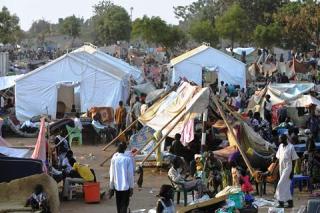Rights groups call on AU to publish report on South Sudan crimes
January 28, 2015 (ADDIS ABABA) – International and national human rights and civil society organisations have called on the African Union (AU) to make public its findings in an investigation into crimes committed by warring parties in South Sudan.

In a statement released on Tuesday, Human Rights Watch (HRW) urged the continental body to publish its findings, saying making it public will unveil responsibilities and make accountable major players in the conflict.
“If the African Union (AU) decides to keep its report documenting wartime abuses in South Sudan under wraps, it could hinder bringing those responsible for war crimes and crimes against humanity to account,” partly reads the statement by HRW director for Africa, Daniel Bekele.
HRW praised the AU’s creation of the Commission of Inquiry and its task on South Sudan as a crucial step in the right direction, but warned its unprecedented effort risks being undermined if the report is not made public.
“Some regional players may be reluctant to see the information in the report published on the idea that it could upset current peace negotiations,” the statement observed, but added the assumption was misplaced.
“To the contrary, the parties to the peace negotiations should be fully confronted with the commission’s findings, and they should be pressed for concrete steps to bring about justice in any peace agreement,” it says.
The region’s long history of impunity for grave crimes has only fuelled the abuses in the recent war and that if South Sudan were to end cycles of violence, ensuring justice this time around is one of the key ingredients, it observed.
SOUTH SUDAN CIVIL SOCIETIES WANT REPORT RELEASED
A group of 20 civil society organisations have also written a petition to the AU’s Peace and Security Council, urging the regional body to release the report to the public.
“We believe that the release of the Commission of Inquiry’s report and the provision of timely public information on its findings and status could play a critical role in deterring further violations and abuses and bringing sustainable peace to South Sudan,” they argued in a joint statement addressed to AU.
The civil societies further said the report, if made public, will be an important reminding tool to deter the perpetrators from further committing crimes.
WARRING PARTIES DIVIDED
The two warring parties in South Sudan have however responded with mixed reactions on what to do with the report.
President Salva Kiir’s government reportedly sought the intervention of IGAD to prevent the release the findings of the AU inquiry commission, as it fears that international sanctions based on its recommendation.
African Union sources say the report includes a recommendation to impose sanction on the warring parties convicted of war crimes.
Also the agreement on the reunification of the SPLM signed in Arusha on 21 January provides that any SPLM member convicted of “crimes against humanity, war crimes, crimes against peace or gross human rights violations and abuses” since 15th December 2013 shall be eligible to hold public office in the SPLM and the South Sudan government.
The leader of the rebel faction of the Sudan Peoples’ Liberation Movement (SPLM-IO), Riek Machar, has however called on the African Union to release and make public the report.
“We demand that the AU should release and make public the report prepared by the Commission of Inquiry,” he said on Saturday from the Kenyan capital, Nairobi.
The opposition group argued that the report will reveal the damages done and provide crucial information on the need to address the situation in the ongoing negotiations as well as become the basis for accountability, justice and reconciliation.
For the past one year of the conflict, tens of thousands have died, 2 million uprooted from their homes and four million others threatened by hunger and diseases.
Recommendations of the AU’s report, if released and submitted to the United Nations Security Council (UNSC) may likely be used as a basis for further action should the warring parties not sign a peace agreement.
(ST)
